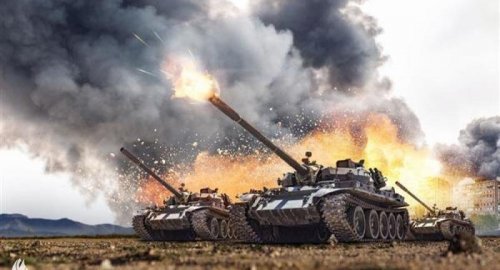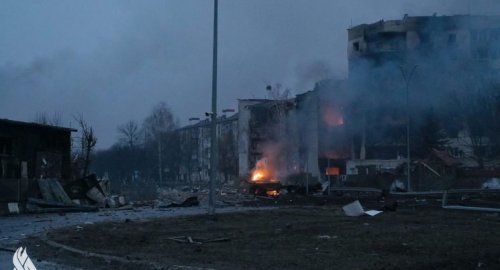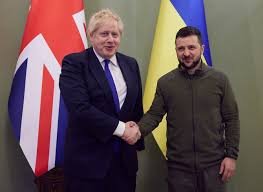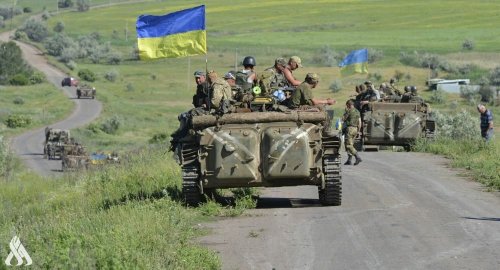
In Response To The Ukrainian Counter-Attack, Moscow Launches “Intense Strikes” On All Fronts

- 14-09-2022, 10:30
INA- sources
On Tuesday, the Russian army announced that it was launching “intense strikes” on all fronts in response to a lightning counter-attack by Ukrainian forces, which the Kremlin accused of committing atrocities in the areas it regained control, while Kyiv attributed to Russian soldiers “up to two hundred war crimes a day.”
As of Tuesday evening, the Russian bombings had killed eight people and wounded 19 within 24 hours among the residents of the Kharkiv (northeastern) and Donetsk (eastern) regions, according to the Ukrainian presidency.
For its part, the Ukrainian Army Chief of Staff confirmed that “Ukraine records up to two hundred war crimes committed every day by the Russians” on its territory, adding that “the occupiers have planted mines in more than 70,000 square kilometers in ten Ukrainian regions.”
The General Staff indicated that the Russian “looting operations” continued, explaining that about 300 cars were stolen in the Kharkiv region.
In return, Russia accused Ukrainian soldiers of revenge against civilians in the areas they recaptured in recent days.
“According to our information, many punitive measures have taken place against the residents of the Kharkiv region, people are subjected to torture and ill-treatment,” said Kremlin spokesman Dmitry Peskov. “This is appalling.”
Heavy blows
During a meeting of the Chief of Staff on Tuesday, Ukrainian President Volodymyr Zelensky confirmed that “more than four thousand square kilometers and more than 300 towns have been liberated. Measures are being taken to impose stability while the offensive continues.”
For its part, the Russian Defense Ministry announced on Tuesday that “the Russian air, ballistic and artillery forces are carrying out intensive strikes against units of the Ukrainian Armed Forces in all areas of operation.”
She cited bombings near Sloviansk, Konstantinovka, and Bakhmut in eastern Ukraine, in the Mykolaiv and Zaporizhia regions in the south as well as in Kharkiv in the northeast, where Ukraine led a violent counterattack that forced Russian forces to withdraw from most of the region.
And the Kremlin had previously confirmed Monday that the Russian military operation, which began on February 24, will continue “until its goals are achieved,” noting that “there are no prospects for negotiations now” between Moscow and Kiev.
On Monday, Ukraine spoke of new military successes, stressing that it had reached the Russian borders and regained the equivalent of seven times the area of Kyiv in one month.
The Ukrainian army confirmed on Tuesday that “the liberation of towns occupied by Russian invaders continues in the Kharkiv and Donetsk regions.”
“Power has been restored to the city of Kharkiv and the whole region,” said Assistant Director of the Presidential Administration Kirill Tymoshenko.
“Since the beginning of September, our soldiers have liberated 6,000 square kilometers of land in eastern and southern Ukraine,” Ukrainian President Volodymyr Zelensky said, stressing that his forces “continue to advance.”
The Institute for the Study of War, based in the United States, said on Tuesday that the Russians “are unable to consolidate the new front line after the Ukrainian gains in the east of the Kharkiv region, and they flee in large numbers from the region or are deployed again on other axes.”
“Obviously we’ve seen a lot of progress from the Ukrainians, especially in the northeast,” US Secretary of State Anthony Blinken told a news conference Monday in Mexico, but “it’s too early to know exactly where this is going.”
A call for a Russian “withdrawal”.
On the diplomatic front, German Chancellor Olaf Scholz called on Russian President Vladimir Putin on Tuesday to “withdraw all his forces” from Ukraine.
In his conversation with the Russian president, Schulz stressed “to find a diplomatic solution as quickly as possible based on a ceasefire, a complete withdrawal of Russian forces and respect for Ukraine’s territorial integrity and sovereignty,” the chancellery said in a statement. Schulz also asked Putin for a “full” implementation of the Ukrainian grain export agreement.
Pressure is mounting on Shultz in Kyiv and in his coalition government to send tanks capable of bolstering the successes of the Ukrainian counterattack.
Estonian Prime Minister Kaia Kallas and Lithuanian President Gitanas Nauseda on Tuesday called on French President Emmanuel Macron to increase military aid to Ukraine, during a phone call at the initiative of Paris.
And before the European Parliament, European Union Foreign Minister Josep Borrell announced Tuesday that he would propose to member states to approve new funding to send weapons to Ukraine.
In Kyiv, Danish Defense Minister Morten Podskov told the Danish Ritzau news agency that his country would train Ukrainian soldiers on its soil.
On Tuesday, Finnish Prime Minister Sanna Marin called for the unity of the European Union and for the imposition of new sanctions against Russia in the face of “blackmail” it is practicing in the field of energy.
European Union energy ministers will meet on September 30 to assess emergency measures proposed by the Commission aimed at curbing the rise in gas and electricity prices caused by the war in Ukraine.
source: globe echo
Oil: Our gas production reaches 3100 cubic feet per day
- Economy
- 09:05
Al-Sistani: Sunday, is the first day of of Ramadan
- Local
- 25/02/28
Al-Alaq: 20 Iraqi banks practice direct transfers
- Economy
- 25/03/04
Oil companies to meet with KRG oil companies next Tuesday
- Economy
- 25/03/01












